List of Cricketers of the Year












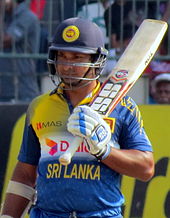
The Wisden Cricketers of the Year are cricketers selected for the honour by the annual publication Wisden Cricketers' Almanack , based primarily on their "influence on the previous English season". [1] The award began in 1889 with the naming of "Six Great Bowlers of the Year", [2] and continued with the naming of "Nine Great Batsmen of the Year" in 1890 and "6 Great Wicket-Keepers" in 1891. [3]
Since 1897, with a few notable exceptions, the annual award has recognised five players of the year. No players were named in 1916 or 1917, as the First World War prevented any first-class cricket being played in England, while in 1918 and 1919 the recipients were five schoolboy cricketers. [3] From 1941 to 1946, the Second World War caused the same issue and no players were named. Three players have been sole recipients: W. G. Grace (1896), Plum Warner (1921) and Jack Hobbs (1926). The latter two selections are the only exceptions to the rule that a player may receive the award only once. Hobbs was first recognised in 1909, but was selected a second time in 1926 to honour his breaking W. G. Grace's record of 126 first-class hundreds; [4] Warner was first honoured in 1904, but received a second award in 1921 for his last season in first-class cricket, when he led Middlesex to a County Championship win. [4] John Wisden, cricketer and eponymous founder of the almanack, was featured in a special commemorative section in the Jubilee edition of the publication in 1913, 29 years posthumously. [5]
From 2000 to 2003 the award was made based on players' impact on cricket worldwide rather than just the preceding season in England, [3] but the decision was reversed in 2004 with the introduction of a separate Wisden Leading Cricketer in the World award. [6]
The oldest surviving recipient of the award is Neil Harvey (1954), which he became in February 2022 with the death of Sonny Ramadhin. The longest that a recipient has lived after receiving the award is 77 years by Harry Calder (1918), who died in 1995. Calder, however, uniquely for a male recipient, played no first-class cricket. Among first-class players, the longest-lived after receipt of the award is 74 years by Wilfred Rhodes (1899).
Ten women have been chosen: Claire Taylor (2009), Charlotte Edwards (2014), Heather Knight (2018), Natalie Sciver (2018), Anya Shrubsole (2018), Tammy Beaumont (2019), Ellyse Perry (2020), Dane van Niekerk (2022), Harmanpreet Kaur (2023), and Ashleigh Gardner (2024).













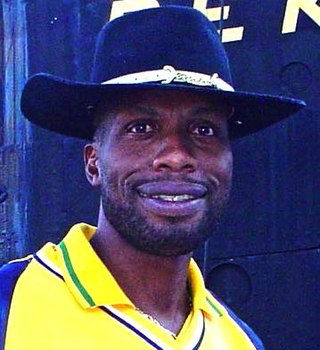
Sir Curtly Elconn Lynwall Ambrose KCN is an Antiguan former cricketer who played 98 Test matches for the West Indies. Widely acknowledged as one of the greatest fast bowlers of all time, he took 405 Test wickets at an average of 20.99 and topped the ICC Player Rankings for much of his career to be rated the best bowler in the world. His great height—he is 6 feet 7 inches (2.01 m) tall—allowed him to make the ball bounce unusually high after he delivered it; allied to his pace and accuracy, it made him a very difficult bowler for batsmen to face. A man of few words during his career, he was notoriously reluctant to speak to journalists. He was chosen as one of the Wisden Cricketers of the Year in 1992; after he retired he was entered into the International Cricket Council Hall of Fame and selected as one of West Indies all-time XI by a panel of experts.
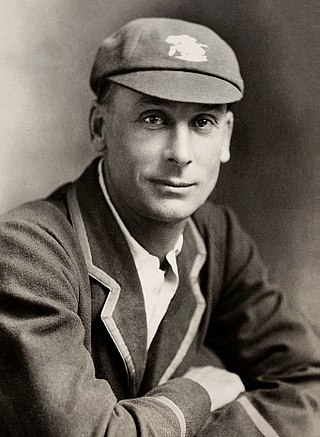
Sir John Berry Hobbs was an English professional cricketer who played for Surrey from 1905 to 1934 and for England in 61 Test matches between 1908 and 1930. Known as "The Master", he is widely regarded as one of the greatest batsmen in the history of cricket. He is the leading run-scorer and century-maker in first-class cricket, with 61,760 runs and 199 centuries. A right-handed batsman and an occasional right-arm medium pace bowler, Hobbs also excelled as a fielder, particularly in the position of cover point. Hobbs was named as one of the five Wisden Cricketers of the Century alongside Sir Donald Bradman, Sir Garfield Sobers, Shane Warne, and Sir Viv Richards.
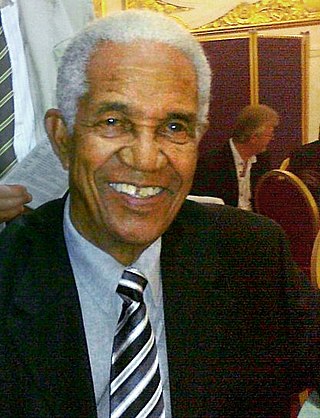
Sir Garfield St Aubrun Sobers, AO, OCC, also known as Sir Gary or Sir Garry Sobers, is a former Barbadian cricketer who played for the West Indies between 1954 and 1974. A highly skilled bowler, an aggressive batsman and an excellent fielder, he is widely considered to be cricket's greatest ever all-rounder and one of the greatest cricketers of all time.

Mushtaq Ahmed is a Pakistani cricket coach and former cricketer who currently acts as the spin bowling coach for the Bangladesh national cricket team. A leg break googly bowler, at his peak he was described as being one of the best three wrist-spinners in the world. In an international career that spanned from 1990 until 2003, he claimed 185 wickets in Test cricket and 161 in One Day Internationals. He was at his most prolific internationally between 1995 and 1998, but his most successful years were as a domestic player for Sussex in the early 2000s.

Hedley Verity was a professional cricketer who played for Yorkshire and England between 1930 and 1939. A slow left-arm orthodox bowler, he took 1,956 wickets in first-class cricket at an average of 14.90 and 144 wickets in 40 Tests at an average of 24.37.
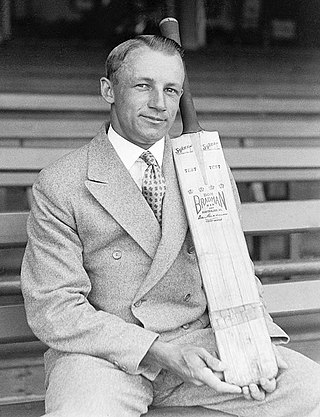
The Wisden Leading Cricketer in the World is an annual cricket award selected by Wisden Cricketers' Almanack. It was established in 2004, to select the best cricketer based upon their performances anywhere in the world in the previous calendar year. A notional list of previous winners, spanning from 1900 to 2002, was published in the 2007 edition of Wisden.

Robert Peel was an English professional cricketer who played first-class cricket for Yorkshire between 1883 and 1897. Primarily a left-arm spin bowler, Peel was also an effective left-handed batsman who played in the middle order. Between 1884 and 1896, he was regularly selected to represent England, playing 20 Test matches in which he took 101 wickets. Over the course of his career, he scored 12,191 runs and took 1,775 wickets in first-class cricket. A match-winning bowler, particularly when conditions favoured his style, Peel generally opened the attack, an orthodox tactic for a spinner at the time, and was highly regarded by critics.

Wilfred Rhodes was an English professional cricketer who played 58 Test matches for England between 1899 and 1930. In Tests, Rhodes took 127 wickets and scored 2,325 runs, becoming the first Englishman to complete the double of 1,000 runs and 100 wickets in Test matches. He holds the world records both for the most appearances made in first-class cricket, and for the most wickets taken (4,204). He completed the double of 1,000 runs and 100 wickets in an English cricket season a record 16 times. Rhodes played for Yorkshire and England into his fifties, and in his final Test in 1930 was, at 52 years and 165 days, the oldest player who has appeared in a Test match.
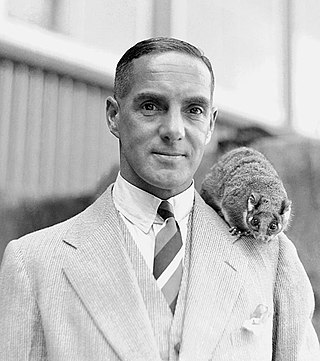
Herbert Sutcliffe was an English professional cricketer who represented Yorkshire and England as an opening batsman. Apart from one match in 1945, his first-class career spanned the period between the two world wars. His first-class debut was delayed by the First World War until 1919 and his career was effectively terminated in August 1939 when he was called up for military service in the imminent Second World War. He was the first cricketer to score 16 centuries in Test match cricket. He is most famous for being the partner of Jack Hobbs and the partnership between the two, Hobbs and Sutcliffe, is widely regarded as the greatest partnership of all time.

The Australian cricket team in England in 1948 is famous for being the only Test match side to play an entire tour of England without losing a match. This feat earned them the nickname of "The Invincibles", and they are regarded as one of the greatest cricket teams of all time. According to the Australian federal government, the team "is one of Australia's most cherished sporting legends". The team was captained by Don Bradman, who was making his fourth and final tour of England.
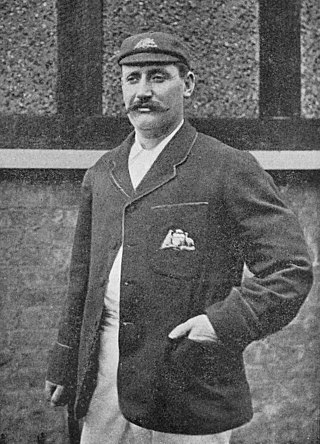
George Henry Stevens Trott was an Australian cricketer who played 24 Test matches as an all-rounder between 1888 and 1898. Although Trott was a versatile batsman, spin bowler and outstanding fielder, "it is as a captain that he is best remembered, an understanding judge of human nature". After a period of some instability and ill discipline in Australian cricket, he was the first in a succession of assertive Australian captains that included Joe Darling, Monty Noble and Clem Hill, who restored the prestige of the Test team. Respected by teammates and opponents alike for his cricketing judgement, Trott was quick to pick up a weakness in opponents. A right-handed batsman, he was known for his sound defence and vigorous hitting. His slow leg-spin bowling was often able to deceive batsmen through subtle variations of pace and flight, but allowed opposition batsmen to score quickly.
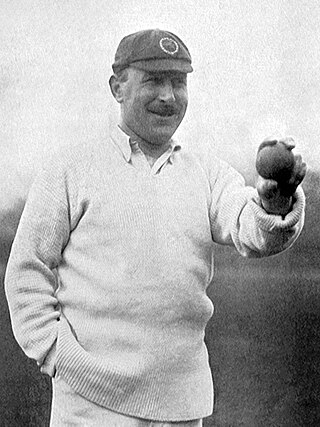
George Herbert Hirst was a professional English cricketer who played first-class cricket for Yorkshire County Cricket Club between 1891 and 1921, with a further appearance in 1929. One of the best all-rounders of his time, Hirst was a left arm medium-fast bowler and right-handed batsman. He played in 24 Test matches for England between 1897 and 1909, touring Australia twice. He completed the double of 1,000 runs and 100 wickets in an English cricket season 14 times, the second most of any cricketer after his contemporary and team-mate Wilfred Rhodes. One of the Wisden Cricketers of the Year for 1901, Hirst scored 36,356 runs and took 2,742 wickets in first-class cricket. In Tests, he made 790 runs and captured 59 wickets.

Frederick Martin, also known as Fred Martin and Nutty Martin, was an English professional cricketer who bowled left-arm medium-pace spin. Martin played first-class cricket between 1885 and 1892, primarily for Kent County Cricket Club, and appeared twice in Test matches for the England cricket team. He was considered one of the best left-arm spin bowlers in the country between 1889 and 1891.
In the 1970 English cricket season, a scheduled South African tour was cancelled for political reasons. As this meant there would be no international cricket in England that season, a Rest of the World team was assembled to play a series of five-day matches against England. At the time, they were played as Test matches, but that status was later revoked by the International Cricket Conference (ICC) and they are now termed unofficial Tests, though still officially first-class matches.
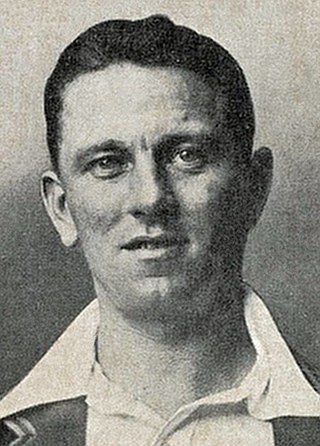
Maurice Leyland was an English international cricketer who played 41 Test matches between 1928 and 1938. In first-class cricket, he represented Yorkshire County Cricket Club between 1920 and 1946, scoring over 1,000 runs in 17 consecutive seasons. A left-handed middle-order batsman and occasional left-arm spinner, Leyland was a Wisden Cricketer of the Year in 1929.
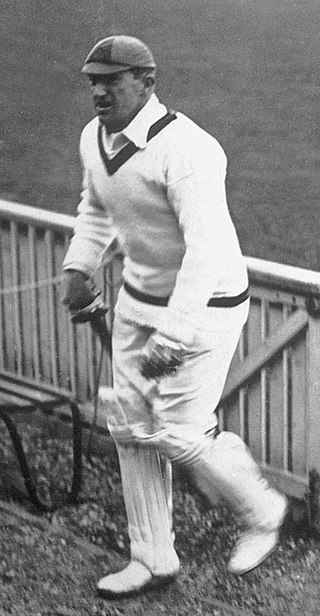
George Aubrey Faulkner was a South African cricketer who played 25 Test matches for South Africa and fought in both the Second Boer War and World War I. In cricket, he was an all-rounder who was among the best batsmen in the world at his peak and was one of the first leg spin bowlers to use the googly.
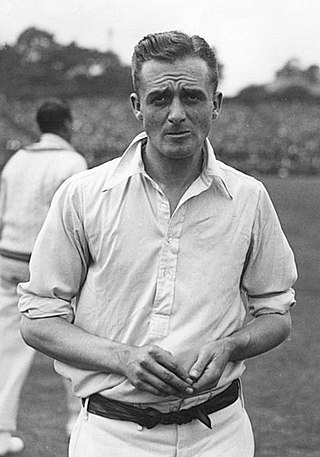
George Gibson Macaulay was a professional English cricketer who played first-class cricket for Yorkshire County Cricket Club between 1920 and 1935. He played in eight Test matches for England from 1923 to 1933, achieving the rare feat of taking a wicket with his first ball in Test cricket. One of the five Wisden Cricketers of the Year in 1924, he took 1,838 first-class wickets at an average of 17.64 including four hat-tricks.

John Cowie was a New Zealand cricketer who played in nine Tests from 1937 to 1949. His Test opportunities were restricted by New Zealand's limited programme, and his cricket career was interrupted by World War II from 1939 to 1945. Following the 1937 tour of England, Wisden commented: "Had he been an Australian, he might have been termed a wonder of the age."
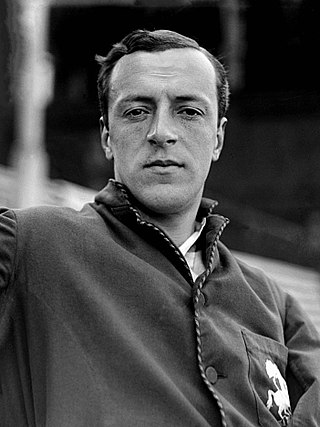
Bernard James Tindal Bosanquet was an English cricketer best known for inventing the googly, a delivery designed to deceive the batsman. When bowled, it appears to be a leg break, but after pitching the ball turns in the opposite direction to that which is expected, behaving as an off break instead. Bosanquet, who played first-class cricket for Middlesex between 1898 and 1919, appeared in seven Test matches for England as an all-rounder. He was chosen as a Wisden Cricketer of the Year in 1905.

Sir John Berry "Jack" Hobbs was an English professional cricketer who played for Surrey from 1905 to 1934 and for England in 61 Test matches between 1908 and 1930. Born into poverty in Cambridge, Hobbs displayed little distinction as a cricketer until relatively late in life. After some limited early success, he began to aspire to a career in professional cricket, and a sudden improvement in 1901 made this more likely. Following the death of his father, the whole family depended on Hobbs but he was supported by Tom Hayward, a professional cricketer who played for Surrey. Hayward arranged for Hobbs to have a trial at Surrey, and after he was successful, Hobbs spent two years qualifying to play County Cricket.
General
Specific